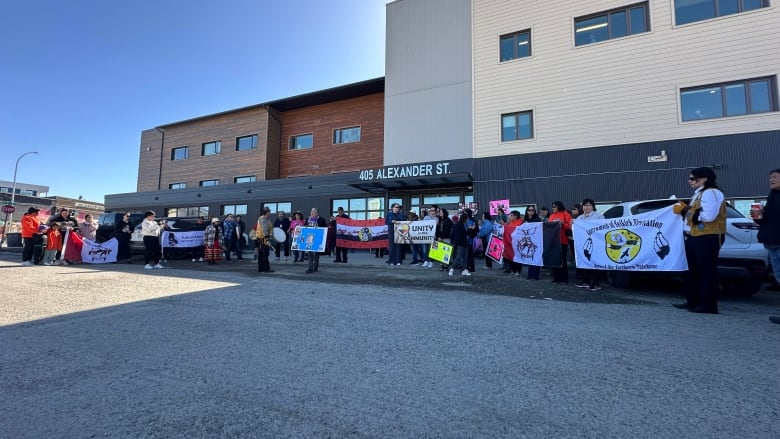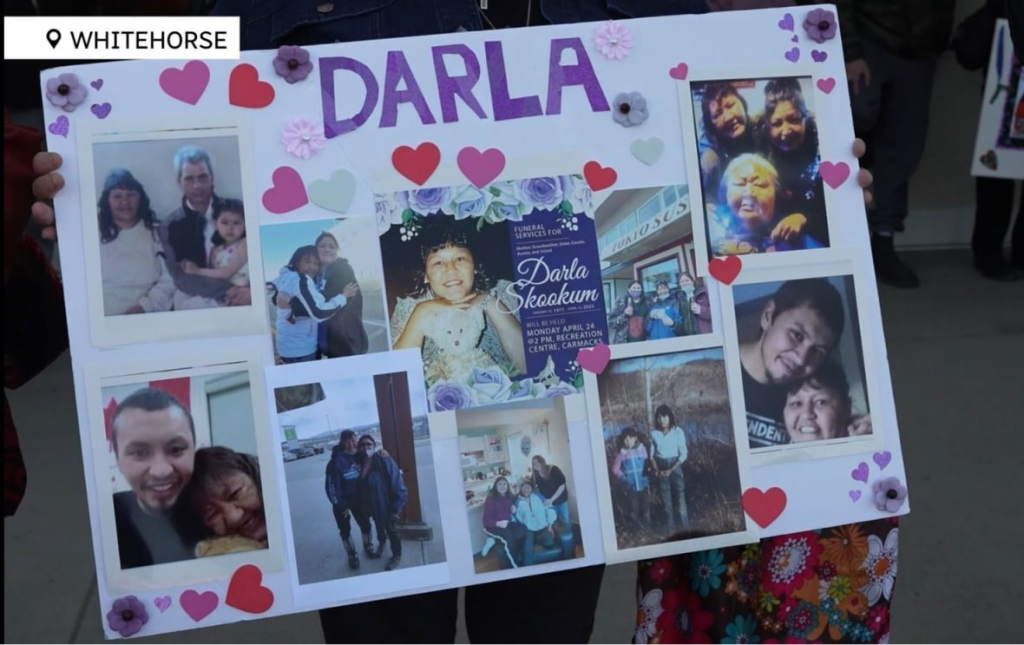Canada News
Yukon government says it will implement all inquest recommendations

Families and supporters of four deceased women stood in front of the Whitehorse Emergency Shelter after the inquest. The territorial government says it’s collaborating with community partners and acknowledges the need for systemic changes. (Virginie Ann/CBC)
· CBC News
Jury issue 8 recommendations after inquest into deaths of 4 Indigenous women at shelter
The Yukon government says it plans to implement all the recommendations issued at the end of a coroner’s inquest into the deaths of four Indigenous women at a shelter before the end of October.
The government released an update on Friday, saying it has “carefully” reviewed and accepted each recommendations.
“The goal is to have all recommendations implemented by the end of October 2024,” the statement said.
“The government of Yukon’s approach aims to ensure a safe, supportive and responsive environment for all clients of [the shelter], honouring the memory of those who have been lost and upholding the government’s commitment to community wellbeing.”
The update comes three months after the end of an emotional inquest.
It focused on the deaths of four Indigenous women at 405 Alexander — the Whitehorse Emergency Shelter. Myranda Tizya-Charlie, Cassandra Warville, Josephine Elizabeth Hager and Darla Skookum died at the shelter in 2022 and 2023.
After three weeks of testimony from shelter staff, administrators, government officials, RCMP officers and others, including friends and family of the deceased women, the jury found that the women died of accidental causes — all as a result of substances use.
Eight recommendations came out of the inquest, most of which were directly addressed to Connective Support Society, the non-profit that has been responsible for operating the facility since October 2022. But the Yukon government was also tasked with implementing some changes.
Stephen Doyle, with the Department of Health and Social Services, says the government is looking at just that.
“The government and Connective recognized that they can both be better,” Doyle said.
“There’s been a lot of work to really dive into that and to identify either updating policies and procedures or adding new policies and procedures, and as well as looking at their their training modules.”
No additional budget to address recommendations
Doyle, however, says there’s no additional budget to address recommendations. He told CBC the government has been working on an implementation plan, without giving any specifics.
One of the recommendations tasked both Connective and the government to meet within two months with communities affected by the deaths of the four Indigenous women.
Doyle says that has yet to happen.
For Lorraine O’Brien, one of Skookum’s sisters, the pain was still too fresh after the inquest to meet with anyone.
“At the end of the inquest, we were quite angry,” O’Brien said, adding that time healed some of it.
“We walked away with more questions than answers … We’re gonna do what we can to make sure our sister’s death doesn’t go without anything being done about it. She’s not just a garbage you could throw away. We love her very much … somebody needs to be held responsible for what happened.”

Little Salmon/Carmacks First Nation, which Skookum was a member of, told CBC it’s working closely with Connective and the government. Some of the other First Nations impacted by the deaths didn’t respond to requests from CBC.
Almost all the other recommendations heavily focused on policy and training.
Several witnesses during the inquest talked about gaps in how the shelter operates, including the lack of clear policy or too many that were constantly being reviewed, as well as lack of adequate staff training to keep intoxicated shelter guests safe.
The jury recommended that within six months, Connective should review both its policies and training procedures. That includes giving priority to hiring Indigenous staff and people with lived experience. Connective should also create a safe space at the shelter for LGBTQ2S+ and female-identifying guests.
The jury called on the territorial’s government to ensure Connective follows through on those changes.
“Some of the recommendations have not been fully completed yet, like some of the policy changes or some of the training, some of the safe space stuff still is getting worked on,” Doyle said.
“We’re still pretty early days.”
This article is republished from RCI.





















